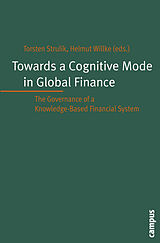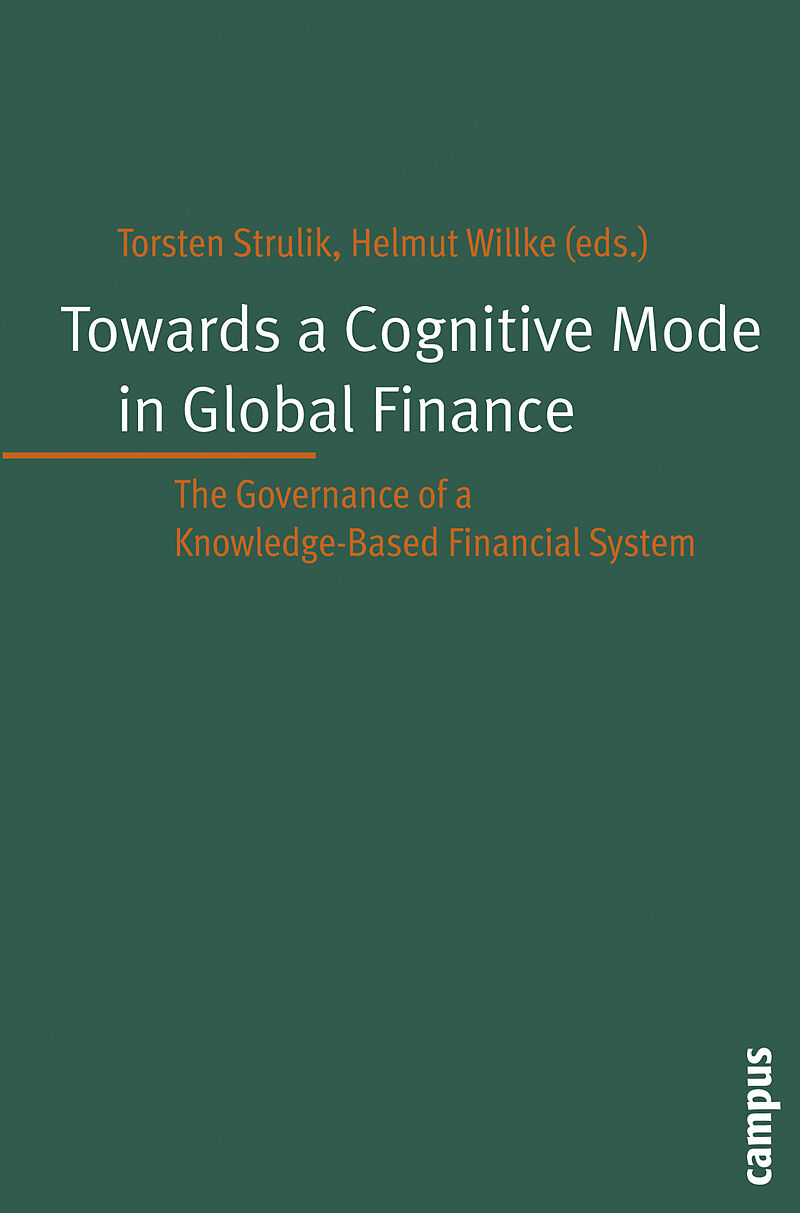Towards a Cognitive Mode in Global Finance
Einband:
Paperback
EAN:
9783593381565
Untertitel:
The Governance of a Knowledge-Based Financial System
Genre:
Arbeits-, Wirtschafts- & Industriesoziologie
Herausgeber:
Campus Verlag GmbH
Auflage:
1. Aufl. 02.2007
Anzahl Seiten:
305
Erscheinungsdatum:
28.02.2007
ISBN:
978-3-593-38156-5
Englischsprachige Publikationen
Die zunehmende gesellschaftliche Bedeutung von Wissen und Wissensmanagement zeigt sich besonders deutlich im globalen Finanzsystem. Das Ende des Bretton- Woods-Systems 1973 markiert den Ausgangspunkt eines Finanzgeschäfts, dessen Steuerung durch einen kognitiven Umgang mit Unsicherheit bestimmt wird. An konkreten Beispielen (wie Bankgeschäft, Rechnungswesen, Rating) untersuchen die Autoren die Merkmale und Konsequenzen eines wissensintensiven finanzwirtschaftlichen und politischen Risikomanagements.
Autorentext
Torsten Strulik ist Heisenberg- Stipendiat der Deutschen Forschungsgemeinschaft und Privatdozent an der Fakultät für Soziologie der Universität Bielefeld. HelmutWillke ist dort Professor für Staatstheorie und Global Governance.
Leseprobe
Introduction Torsten Strulik 1. The Governance of Global Finance 2. Normative and Cognitive Expectations 3. Governance as a Cognitive Problem 4. Towards a Cognitive Mode of Global Finance? 1. The Governance of Global Finance The end of the Bretton Woods System in 1973 is widely seen as the starting point of the global financial business. Although the first global financial market had already been established in the form of the Euromarket in 1958, the transition to flexible exchange rates set financial economic dynamics in motion which reflected both a globalization of transactions and high-speed innovation. For the governance of the financial system, the developments of the last three decades have meant a massive expansion of the range of opportunities for market actors. With the support of new information technologies and communication media, domestic and offshore financial markets have been opened and integrated into a single global market, including all industrial as well as a growing number of developing countries. At the same time, social expectations regarding the ability of public actors to intervene have grown disproportionately to their ability to keep up with the new opportunities and competencies of the market actors. There is a discernable institutional gap between the global nature of finance and the domestic charter of central banks and supervisory agencies. On the basis of this diagnosis numerous observers have attributed current problems in regulating global finance to a transition from a government led international monetary system to a market-led international monetary system (Padoa-Schioppa/Saccomanni 1994). The corresponding research question is: Which new forms of governance respond to an increasing exterritorialization and autonomy of financial transactions? Instructive analyses can be found not only of institutional and regulatory adaptations on the national, international and supranational levels (e.g. Dale 1984; Kapstein 1996; Eichengreen 1999; Scholte 2002; Wood 2005) but also of the increasing relevance of private actors (e.g. Sinclair 1994; Tsingou 2003) and mixed public-private arrangements (e.g. Strulik 2000). This book aims at opening up a complementary perspective. On the one hand, diagnoses of exterritorialization and the autonomy of finance are addressed. On the other hand, a shift of research towards the relevance of knowledge for governance might produce new insights in light of the continuing development of the regulatory field as well as the intensification of the debate on the characteristics and effects of the knowledge society (e.g. Adhikari/Sales 2001; Willke 2002). This introduction will argue that, for an adequate understanding of the current governance problems of global finance, it is important to consider the characteristics and consequences of the knowledge production of the global financial system as well as the relevance of knowledge for politics. The starting point of this analysis is the assumption that the globalization of the financial business is not only accompanied by a spatial incongruity of financial economic and political opportunities for action. Considering Niklas Luhmann´s (1991) thoughts on the emergence of a world society, it appears instructive to examine the present problems of the governance of global finance in respect to different expectation structures towards which the functionally specialized societal subsystems of politics, law and the economy orient themselves.
Inhalt
Contents Preface and Acknowledgements 7 Introduction 9 Torsten Strulik Part 1: Theoretical Perspectives on Knowledge and Finance The Autonomy of the Financial System: Symbolic Coupling and the Language of Capital 36 Helmut Willke On the Unity and Difference of Finance and the Economy: Investigations for a New Sociology of Money 70 Hanno Pahl An Institutional Approach to the Politics of Global Finance 104 Timothy J. Sinclair Part 2: Cultures and Techniques of a Cognitive Mode How Financial Numbers are Symptomatic 132 Hendrik Vollmer Cultures of Economic Calculation 156 Herbert Kalthoff Cognitive Shifts in Regulation: The Role of Ignorance in the Regulatory Field of Accounting 180 Alexandra Hessling Part 3: The Importance of Private Expertise in Financial Governance The Role of Policy Communities in Global Financial Governance: A Critical Examination of the Group of Thirty 213 Eleni Tsingou Rating Agencies, Ignorance and the Knowledge-Based Production of System Trust 239 Torsten Strulik Part 4: Basel II - A Cognitive Turn in Banking Regulation? Governance without Politics? Administration and Politics in the Basel II Process 259 Boris Holzer Making Use of Cognitive Standards: On the Logic of a New Mode of Governance in Global Finance 279 Matthias Kussin/Sven Kette Authors 304

Leider konnten wir für diesen Artikel keine Preise ermitteln ...
billigbuch.ch sucht jetzt für Sie die besten Angebote ...
Die aktuellen Verkaufspreise von 6 Onlineshops werden in Realtime abgefragt.
Sie können das gewünschte Produkt anschliessend direkt beim Anbieter Ihrer Wahl bestellen.
Loading...
Die aktuellen Verkaufspreise von 6 Onlineshops werden in Realtime abgefragt.
Sie können das gewünschte Produkt anschliessend direkt beim Anbieter Ihrer Wahl bestellen.
| # | Onlineshop | Preis CHF | Versand CHF | Total CHF | ||
|---|---|---|---|---|---|---|
| 1 | Seller | 0.00 | 0.00 | 0.00 |
